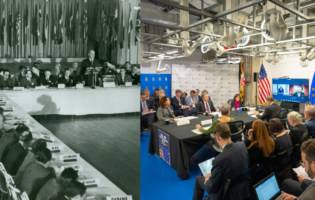AGI News
The Presidential Campaign and The Future of U.S. Trade Policy: Implications for Transatlantic Relations


Peter S. Rashish
Vice President; Director, Geoeconomics Program
Peter S. Rashish, who counts over 25 years of experience counseling corporations, think tanks, foundations, and international organizations on transatlantic trade and economic strategy, is Vice President and Director of the Geoeconomics Program at AICGS. He also writes The Wider Atlantic blog.
Mr. Rashish has served as Vice President for Europe and Eurasia at the U.S. Chamber of Commerce, where he spearheaded the Chamber’s advocacy ahead of the launch of the Transatlantic Trade and Investment Partnership. Previously, Mr. Rashish was a Senior Advisor for Europe at McLarty Associates, and has held positions as Executive Vice President of the European Institute, on the Paris-based staff of the International Energy Agency, and as a consultant to the World Bank, the German Marshall Fund of the United States, the Atlantic Council, the Bertelsmann Foundation, and the United Nations Conference on Trade and Development.
Mr. Rashish has testified on the euro zone and U.S.-European economic relations before the House Financial Services Subcommittee on International Monetary Policy and Trade and the House Foreign Affairs Subcommittee on Europe and Eurasia and has advised three U.S. presidential campaigns. He is a member of the Board of Directors of the Jean Monnet Institute in Paris and a Senior Advisor to the European Policy Centre in Brussels. His commentaries have been published in The New York Times, the Financial Times, The Wall Street Journal, Foreign Policy, and The National Interest, and he has appeared on PBS, CNBC, CNN, and NPR.
He earned a BA from Harvard College and an M.Phil. in international relations from Oxford University. He speaks French, German, Italian, and Spanish.
__
The 2016 presidential contest in the United States has been characterized by a particularly heated debate about the role that trade policy should play in promoting US prosperity and national interests. From the start of the campaign with the 1 February Iowa caucuses and the 9 February New Hampshire primary, the impact of past and current trade agreements on US growth, jobs, and wages – and on the global standing of the United States – has been front and centre. Donald Trump’s twin hostility to trade deals and liberal immigration policies provided him with a winning path to the Republican nomination during the third week of July in Cleveland. Hillary Clinton, for her part, was able to secure the Democratic nomination the following week in Philadelphia by a comfortable margin, but only after facing down a challenge on her left from Vermont Senator Bernie Sanders, who made his opposition to all US trade pacts a key part of his appeal to voters.
This Policy Brief was originally published by the European Policy Center on October 27, 2016. Continue reading here.








